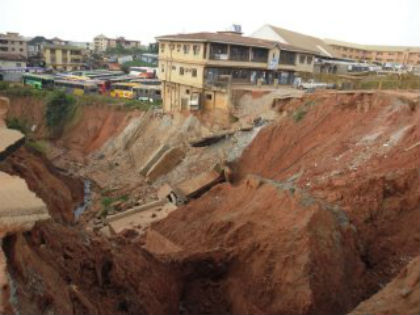
By Greg Odogwu
One of the breaking news in the international media of recent is the story of some mysterious craters discovered in Siberia. The story stated that scientists were baffled last July when they discovered three giant holes in the ground in the Yamal Peninsula in northern Siberia. Now, with the help of satellite imagery, researchers have located four additional craters – and they believe there may be dozens more in the region; and this has them calling for urgent investigation to protect residents living in the area.
Although scientists would be immediately deployed to investigate the cause of such a phenomenon, the preliminary logical conjecture in scientific circles was that it was caused by exploding gas by eruptions of methane gas from the permafrost as rising temperatures cause the frozen soil to melt.
Scientists fear these giant craters could become more common as climate change continues. This is also what I fear, based on empirical reasons.
I feel constrained to throw my weight behind those that see the emerging natural disaster in Siberia as having been caused by climate change. With my elementary knowledge about permafrost, there could be no other explanation for the sudden large holes. Permafrost means permanently frozen land; that is underlying soil or rock that remains permanently frozen, found mainly in the Polar regions. Geographically, most part of Siberia is of the tundra region in the Arctic plain, and known for extreme cold. It can be remembered that during the Communist era, people were sent to Siberia to “rot in the cold.”
Permafrost is supposed to be permanently frozen, but when the warming climate changes the ambient weather, the underground earth thaws out, just like you would have the iron-cast base of your deep freezer naturally begin to thaw when the PHCN interrupts power supply far longer than necessary.
When the permafrost melts, the methane in the subsisting topography then finds space to escape, and because of the inherent pressure, it comes out in an explosive surge, displacing the topsoil. Thus, holes and craters are bound to appear here and there in such regions; it is just a matter of time. Welcome to the future of a warming world!
When the details are finally unravelled, the Siberia phenomenon would teach the world to wake up to the reality of the keg of gunpowder we are sitting on. Climate change is as real as the sky is blue. All that doubters need to do is take a look at the news. The media is filled with evidence. Perhaps, this will also help the world to realise how important it is that we come up with an ambitious and workable Climate Agreement in Paris by the end of the year.
In any case, the Siberian sinkholes can only remind Nigerians that they are far from serious in issues of disaster risk readiness. The government is to blame for not tackling ecological disasters and risks, for instance gully erosion which is ravaging some parts of the country. Yet, the people are to blame for not demanding enough.
In this political period, I expected the affected communities in Anambra, Edo, Enugu, Abia, Imo Cross River to raise hell about their ecological predicament. But what I hear is only communities griping about whether a particular executive or legislative slot is zoned to a particular community or not.
There are thousands of erosion sites in these affected states, with enough potential voters to send the jitters up the spine of any politician. But it seems they never think their environmental situation is consequential enough to swing their voting pattern. None has called for a town hall meeting between the political parties with the sole aim of discussing an agenda for curbing the death traps they call villages and constituencies.
I have not heard about any mention of the Ecological Fund. It has not been deemed as important enough to form the agenda of any political debate or discuss especially at the national level. Yet, this fund is two per cent of every money Nigeria gets. Is it not big enough to be considered as an issue? Even the Nigerian Extractive Industries Transparency Initiative has blown the whistle on the rot in the funds. For the past 11 years, the country squandered N400bn of the Ecological Fund.
There could be nothing as revealing as the drama that played out in the National Assembly when the issue of the Ecological Fund was looked into at the two chambers. The Speaker of the House of Representatives, Aminu Tambuwal, was so shocked at the depth of corruption that he declared it a “ghost fund.”
And at the upper chamber, Deputy Senate President, Ike Ekeremadu, declared it was money washed down the drain: “We have spent billions since 1999 and I’m not aware of any site that has been done. We have the Niger Delta Development Commission, the Ministry of Environment and Ecological Fund and we have not seen any work; it is money down the drain. We need to address this issue. If it is possible to investigate ecological funds, it is better. I think we need to find out what they did with the money. Ultimately, we need to find out what has happened to the money since 1999.”
Ironically, up till this moment, the people we elected never bothered to find out what happened. Perhaps, they were afraid of the ‘ghost’!
A recent report stated how Umuhu in Awgu Local Government Area of Enugu State, which suffered a tremor and landslide, needed just N5m from the state government to conduct geological test on the site. To this moment, no one has provided the funds, which is a ‘chicken change’ if you asked me. Has life become so cheap that we shall endanger the lives and properties of ordinary citizens just because of that paltry sum? Yet, some states illegally appropriated billions of naira from the Ecological Fund just to buy jeeps for government officials.
The truth is that the Western world and other international donor organisations have their table already full with their own environmental troubles, and there is a limit to the assistance they can offer.
Is it not sad to think that the failure of the Ecological Fund and other indigenous interventions was the major reason that inspired the establishment of the Nigeria Erosion and Watershed Management Project, known as the NEWMAP, which is a World Bank-assisted intervention programme?
However, to think that this programme would even scratch the surface of the ecological disasters facing us today is tantamount to a daydream. Example: I read a report which stated that among hundreds of gully erosion sites in Enugu State, NEWMAP only earmarked five “priority erosion sites” out of which just two were approved for site interventions, following the approval of sites engineering designs.
The hard truth is that nature, and in fact Climate Change, is not waiting until the World Bank “scales up its interventions”. It is not relenting. As the rains become more intense and unpredictable, the gullies will be widened and deepened; and even more erosion sites shall erupt.
And while our government continues to use the money apportioned for pre-empting such natural disasters for other projects and purchase of luxury cars and offices, our lands will keep collapsing right under our feet. Surely, one day the politicians will no more see terra firma to drive their government-issue jeeps or even land their chartered choppers!










